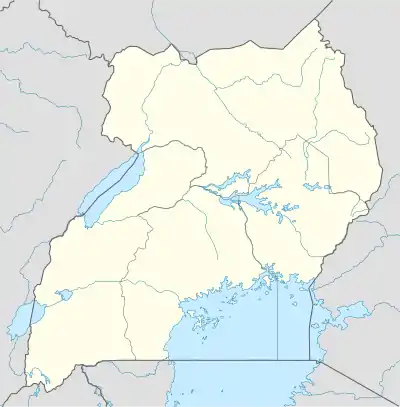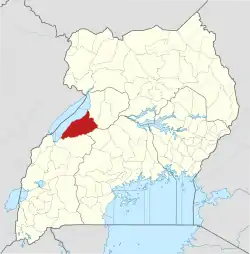Hoima International Airport | |||||||||||
|---|---|---|---|---|---|---|---|---|---|---|---|
| Summary | |||||||||||
| Airport type | Public, civilian | ||||||||||
| Owner | Civil Aviation Authority of Uganda | ||||||||||
| Serves | Hoima, Uganda | ||||||||||
| Location | Hoima District | ||||||||||
| Elevation AMSL | 3,510 ft / 1,070 m | ||||||||||
| Coordinates | 01°27′27″N 31°04′18″E / 1.45750°N 31.07167°E | ||||||||||
| Map | |||||||||||
 Hoima International Airport Location of Hoima International Airport in Buseruka sub-county, Hoima Uganda Placement on map is approximate | |||||||||||
| Runways | |||||||||||
| |||||||||||
Hoima International Airport (IATA: none, ICAO: none), also Kabaale International Airport, is an airport under construction in Hoima, Uganda.[1] It is part of the infrastructure under construction as Uganda prepares to develop its nascent petroleum industry.[2][3] When completed, it would be Uganda's second international airport, besides Entebbe International Airport. The new airport is expected to facilitate mobilization of equipment for construction of the Uganda Oil Refinery and assist in the development of agriculture and tourism in Uganda's Western Region.[4]
Location
Hoima Airport is located in Kabaale Parish, Buseruka sub-county, Hoima District in the Western Region of Uganda, near the Kaiso-Tonya oil fields and the Uganda Oil Refinery.[5] The air distance between the general area where the airport is being built and Entebbe International Airport, Uganda's largest civilian and military airport, is about 200 kilometres (124 mi).[6] Kabaale International Airport sits on 29 square kilometres (11 sq mi).[4] The location of Hoima International Airport is approximately 51 kilometres (32 mi), by road, to the west of the city of Hoima.[7] The elevation of Kabaale Village is 1,070 metres (3,510 ft), above mean sea level.[8]
Overview
This airport would be a large international airport capable of handling large passenger and cargo aircraft, sufficient to carry the equipment and staff to develop the Uganda Oil Refinery and the oilfields.[9][10][11] The airport's main runway was expected to measure 3,100 metres (10,171 ft) in length.[12] Later, the length of the runway was lengthened to 3,500 metres (11,483 ft).[13]
As of February 2016, feasibility studies and the impact assessment evaluation were ongoing.[14][15] Construction was expected to begin in 2017, led by a consortium made up of Colas Limited of the United Kingdom and SBI, a Ugandan construction company.[2][16]
In January 2018, the UK lenders were identified as Standard Chartered Bank with guarantees from the United Kingdom Export Finance, with the two expected to lend €307 million.[17]
Construction
In February 2018, the government of Uganda selected Shikun & Binui, a construction firm based in Israel to construct this airport, at a cost of US$309 million. The construction which will be undertaken by Solel Boneh International Holdings (SBI), the international arm of Shikun & Binui, is expected to last three years.[18] The scope of work includes (a) paving 3.5 kilometres (11,000 ft) of runways (b) carrying out of earthwork and installing drainage infrastructure (c) pouring of cement and asphalt (d) building of electro-mechanical, communications and navigation systems and (e) erection of an air traffic control tower, a cargo terminal, additional residencies and service structures.[19][20][21]
SBC Uganda Limited, a joint venture company between Colas Limited of the United Kingdom and SBI International Holdings of Uganda,[22] started construction of the airport in January 2018.[23] The first phase of construction, including the runway and cargo-handling facilities, is expected to be ready in 2020. This phase is primarily to support construction of the oil refinery.[24][25] The second phase of construction, focused on the facilitation of passengers and boosting tourism and business, is expected to conclude in 2022.[24][25] The project is expected to create about 1,000 jobs,[26][27] 30 percent of which are reserved for the local community and the remaining 70 percent reserved for other Ugandans, with a small number taken up by expatriates.[28] Later, the completion of the first phase was pushed back to 2021.[29] As of April 2019, work completed was estimated at 21 percent.[30] In October 2019, completed work had progressed to 31 percent.[31]
In December 2019, it was estimated that 34 percent of the work had been completed. At that time, a total of over 925 workers were employed on the project. Completion was estimated to be in February 2023.[32] In August 2020, completion was estimated at 45 percent. At that time, a total of 830 workers were on the job, with 30 percent recruited from Hoima District. Twenty percent of the workers are female and 98 percent are Ugandan.[33]
As of June 2021, according to the Petroleum Authority of Uganda, as reported by the Daily Monitor, completion had progressed to an estimated 55 percent, with the 3.5 kilometres (11,000 ft) runway nearly complete. Commercial commissioning is still planned in February 2023.[34] In August 2021, the airport runway was 95 percent complete. At that time overall work on the airport was estimated at 66 percent complete. Commercial commissioning is anticipated no later than June 2023.[35]
In March 2022, construction progress was estimated at 77 percent complete. The airport's jet fuel depot is expected to receive supplies by road from Kenya and later switch to direct supplies from the Uganda Oil Refinery, when that infrastructure is established.[36]
As of May 2022, the runway was reported at 95 percent complete and the cargo building, passenger terminal, power substation house, ground lighting system, the firefighting house and related facilities were about 79 percent complete.[37]
In October 2022, the EPC contactor, SBC Uganda Limited asked for 10 more months and more money to complete the first phase of construction. At that time, approximately 85 percent of the work was complete and about 80 percent of the budget had been spent. Reasons given for the requested changes included delays attributed to the COVID-19 epidemic, increase of the prices of cement, diesel fuel and gasoline, as a result of the Russo-Ukrainian War. The area was also inundated with heavy rains, further slowing down the progress of construction. A new completion date is reported as December 2023.[38]
See also
References
- ↑ Uganda Radio Network (15 May 2018). "Hoima International Airport workers strike over pay". The Observer (Uganda) Quoting Uganda Radio Network. Kampala. Retrieved 16 May 2018.
- 1 2 Agencies (21 December 2016). "Uganda to get second International Airport". Essex, UK: African Aerospace Online News Service. Retrieved 10 June 2017.
- ↑ Mugerwa, Francis (8 April 2013). "Government Says Bunyoro to Get Railway Line, Airport by 2017". Daily Monitor. Kampala. Retrieved 8 March 2016.
- 1 2 CAPA (31 December 2016). "Profile of Hoima International Airport". Sydney: Centre for Aviation (CAPA). Retrieved 10 June 2017.
- ↑ FN (5 June 2013). "Oil sparks roads upgrade". Kampala: Oilinuganda.org. Retrieved 4 March 2016.
- ↑ Distancesfrom.com (17 April 2020). "Estimated Flight Distance Between Entebbe, Uganda And Hoima, Uganda". Distancesfrom.com. Retrieved 17 April 2021.
- ↑ Google (7 September 2022). "Road Distance Between Hoima City, Uganda And Hoima International Airport, Uganda" (Map). Google Maps. Google. Retrieved 7 September 2022.
- ↑ 1Worldmap (7 June 2018). "Elevation of Kabaale Village, Buseruka Sub-county, Hoima District, Uganda". 1Worldmap.com. Retrieved 7 June 2018.
{{cite web}}: CS1 maint: numeric names: authors list (link) - ↑ Mwesigwa, Alon (1 February 2015). "Airports to generate Shs8.5 trillion annually". The Observer (Uganda). Kampala. Retrieved 4 March 2016.
- ↑ Ssekika, Edward (8 April 2015). "Plans to complete refinery compensation underway". The Observer (Uganda). Kampala. Retrieved 4 March 2016.
- ↑ Wandera, Stephen (4 May 2015). "Over 20 firms interested in constructing Hoima Airport". Daily Monitor. Kampala. Retrieved 4 March 2016.
- ↑ Odyek, John (2 April 2016). "Kabaale Airport master plan ready for take off". New Vision. Kampala. Retrieved 10 June 2017.
- ↑ CAPA (30 July 2018). "Hoima Kabaale Parish International Airport: Completion Expected In December 2020". Sydney: Centre for Aviation (CAPA). Retrieved 30 July 2018.
- ↑ RC (13 July 2015). "Ramboll Selected for Onshore Pipeline Study in Uganda: National participation by local partner Newplan". Ramboll.com (RC). Retrieved 4 March 2016.
- ↑ Senelwa, Kennedy (25 July 2015). "Ramboll wins tender for pipeline survey". The EastAfrican. Nairobi. Retrieved 4 March 2016.
- ↑ Gulli, Arnason (20 December 2016). "Colas, SBI Uganda present proposal for Kabaale airport project". Financial-news.co.uk Quoting Air & Travel. London. Retrieved 10 June 2017.
- ↑ Mbanga, Jeff (4 January 2018). "Year of mega infrastructure projects and related risks". The Observer (Uganda). Kampala. Retrieved 5 January 2018.
- ↑ Airport-technology.com (8 February 2018). "Shikun & Binui wins $309 million airport construction contract in Uganda". Airport-technology.com. Retrieved 9 February 2018.
- ↑ Staff Writer (20 February 2018). "$309M For New Uganda Airport". Red Pepper. Kampala. Retrieved 21 February 2018.
- ↑ Earth Finds (27 November 2019). "Kabaale International Airport Construction Works 34 Percent Complete". Kampala: Earth Finds Uganda. Retrieved 22 February 2020.
- ↑ Press Release (15 October 2019). "Systems Interface win Navaid and AWOS contract for new International Airport in Uganda". Coulsdon, Surrey, United Kingdom: Jane's Defence Weekly. Retrieved 22 February 2020.
- ↑ The Uganda Today (2 March 2018). "Hoima Airport contractor SBC Uganda urged to hire local residents". Kampala: Theugandatoday.com. Retrieved 7 June 2018.
- ↑ Odyek, John (30 January 2018). "Hoima International Airport to Employ Locals" (PDF). Kampala: SBI Uganda Limited Quoting New Vision. Retrieved 7 June 2018.
- 1 2 Steenhoff-Snethlage, Erin (11 December 2017). "Second international airport on the way for Uganda". Johannesburg: Ftwonline.co.za. Retrieved 7 June 2018.
- 1 2 Odyek, John (12 February 2018). "Hoima airport to be complete by 2020". New Vision. Kampala. Retrieved 7 June 2018.
- ↑ Earth Finds (14 April 2018). "Hoima Residents Say Oil Airport Contractor Denied Them Jobs". Kampala: Earthfinds.co.ug. Retrieved 7 June 2018.
- ↑ African Aerospace (9 November 2017). "UK firm to build Uganda's second airport". African Aerospace UK. Retrieved 22 March 2019.
- ↑ Africanaerospace (14 February 2019). "Uganda's New Airport Rising From The Bush". Rochford, Essex, United Kingdom: Africanaerospace.aero. Retrieved 17 May 2019.
- ↑ Billé, Stéphane (7 June 2018). "Uganda launches Kabaale International Airport construction". Port-Louis, Mauritius: Ecofin Agency. Retrieved 11 September 2018.
- ↑ Dorothy Nakaweesi (23 April 2019). "Kabaale Airport works at 21%". Daily Monitor. Kampala. Retrieved 23 April 2019.
- ↑ Gambeta News (31 October 2019). "Construction of Kabaale International Airport 31 Percent Complete". Gambeta News. Retrieved 10 December 2019.
- ↑ Francis Mugerwa (31 December 2019). Didas Muhumuza (ed.). "Hoima International Airport set for 2023". Kampala: Oil In Uganda. Retrieved 15 April 2020.
- ↑ Hannington Mutabazi (4 August 2020). "Locals benefiting as works at Hoima International Airport take shape". New Vision. Kampala. Retrieved 26 August 2020.
- ↑ Ambrose Musasizi (3 June 2021). "Construction works at Kabaale International Airport at 55 per cent". Daily Monitor. Kampala. Retrieved 12 June 2021.
- ↑ Ed Reed (20 August 2021). "Work under way at Lake Albert sites". Energyvoice.com. Retrieved 18 September 2021.
- ↑ Paul Murungi (21 April 2022). "Sneak peek into Kabaale airport works". Daily Monitor. Kampala, Uganda. Retrieved 25 April 2022.
- ↑ Ssekanyula Christopher (31 May 2022). "Kabale International Airport Soon Opening for Operation". TalkUganda.com. Kampala, Uganda. Retrieved 7 September 2022.
- ↑ Peter Abaanabasazi (6 October 2022). "Hiking Prices: Kabaale International Airport contractor asks for more time". New Vision. Kampala, Uganda. Retrieved 8 February 2023.
